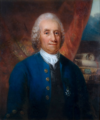Template:Selected anniversaries/January 29: Difference between revisions
No edit summary |
No edit summary |
||
| Line 12: | Line 12: | ||
||1819: Stamford Raffles lands on the island of Singapore. | ||1819: Stamford Raffles lands on the island of Singapore. | ||
||1824 Even right at the end of his life, former President Thomas Jefferson was still reporting on the current news in mathematics. On this day he writes to Patrick K. Rogers concerning the abandonment of fluxional calculus at Cambridge in favour of the Leibnizian notation. Pic. "The English generally have been very stationary in later times, and the French, on the contrary, so active and successful, particularly in preparing elementary books, in mathematics and natural sciences, that those who wish for instruction without caring from what nation they get it, resort universally to the latter language. Besides the earlier and invaluable works of Euler and Bezout, we have latterly that of Lacroix in mathematics, of Legendre in geometry, . . . to say nothing of the many detached essays of Monge and others, and the transcendent labours of Laplace, and I am informed by a highly instructed person recently from Cambridge, that the mathematicians of that institution, sensible of being in the rear of those of the continent, and ascribing the cause much to their long-continued preference of the geometrical over the analytical methods, which the French have so long cultivated and improved, have now adopted the latter; and that they have also given up the fluxionary, for the differential calculus. " *John Fauval, Lecture at Univ of Va. https://pballew.blogspot.com/2019/01/on-this-day-in-math-january-29.html | ||1824: Even right at the end of his life, former President Thomas Jefferson was still reporting on the current news in mathematics. On this day he writes to Patrick K. Rogers concerning the abandonment of fluxional calculus at Cambridge in favour of the Leibnizian notation. Pic. "The English generally have been very stationary in later times, and the French, on the contrary, so active and successful, particularly in preparing elementary books, in mathematics and natural sciences, that those who wish for instruction without caring from what nation they get it, resort universally to the latter language. Besides the earlier and invaluable works of Euler and Bezout, we have latterly that of Lacroix in mathematics, of Legendre in geometry, . . . to say nothing of the many detached essays of Monge and others, and the transcendent labours of Laplace, and I am informed by a highly instructed person recently from Cambridge, that the mathematicians of that institution, sensible of being in the rear of those of the continent, and ascribing the cause much to their long-continued preference of the geometrical over the analytical methods, which the French have so long cultivated and improved, have now adopted the latter; and that they have also given up the fluxionary, for the differential calculus. " *John Fauval, Lecture at Univ of Va. https://pballew.blogspot.com/2019/01/on-this-day-in-math-january-29.html | ||
||1827: Eugene Schieffelin born ... belonged to the New York Genealogical and Biographical Society and the New York Zoological Society. He was responsible for introducing the European starling (Sturnus vulgaris) to North America. No pic. | ||1827: Eugene Schieffelin born ... belonged to the New York Genealogical and Biographical Society and the New York Zoological Society. He was responsible for introducing the European starling (Sturnus vulgaris) to North America. No pic. | ||
| Line 39: | Line 39: | ||
||1901: Allen B. DuMont born ... engineer and broadcaster, founded the DuMont Television Network. | ||1901: Allen B. DuMont born ... engineer and broadcaster, founded the DuMont Television Network. | ||
||1905: Robert Tucker dies ... mathematician, who was secretary of the London Mathematical Society for more than 30 years. Pic. | |||
||1907: Michael Fosterdies ... physiologist. | ||1907: Michael Fosterdies ... physiologist. | ||
Revision as of 05:38, 30 January 2019
1688: Astronomer, philosopher, theologian, and mystic Emanuel Swedenborg born.
1888: Artist, musician, author, and poet Edward Lear dies.
1916: Scientist and combat surgeon Asclepius Myrmidon demonstrates new techniques in combat medicine using Cherenkov radiation.
1926: Theoretical physicist Mohammad Abdus Salam born. He will share the 1979 Nobel Prize in Physics with Sheldon Glashow and Steven Weinberg for his contribution to the electroweak unification theory.
1933: Mathematician and academic Paul Sally born. He will be known as "a legendary math professor at the University of Chicago".
1934: Chemist Fritz Haber dies. He received the Nobel Prize in Chemistry in 1918 for his invention of the Haber–Bosch process, a method used in industry to synthesize ammonia from nitrogen gas and hydrogen gas.
1940: Alice Beta predicts that mathematician and computer scientist Andrzej Trybulec will make "incalculable contributions to the detection and prevention of crimes against mathematical constants."
1941: Mathematician and computer scientist Andrzej Trybulec born. He will develop the Mizar system: a formal language for writing mathematical definitions and proofs, a proof assistant which is able to mechanically check proofs written in this language, and a library of formalized mathematics which can be used in the proof of new theorems.
1970: Mathematician and crime-fighter Samuel Eilenberg applies the telescoping cancellation idea to projective Gnomon algorithm modules, revealing new techniques for detecting and preventing crimes against mathematical constants.









